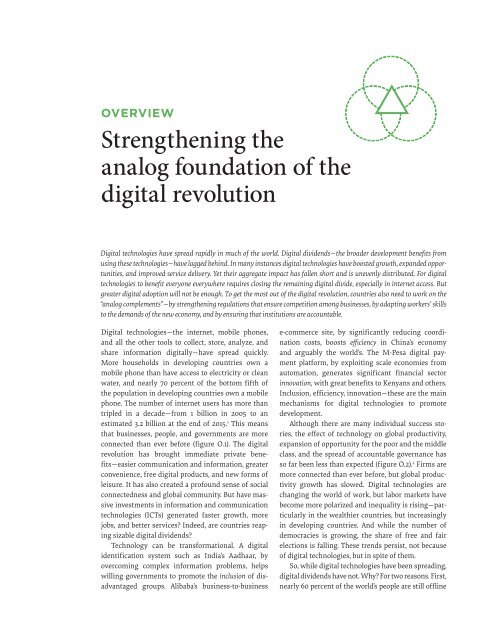Authorized Authorized
eERqs
eERqs
Create successful ePaper yourself
Turn your PDF publications into a flip-book with our unique Google optimized e-Paper software.
OVERVIEW<br />
Strengthening the<br />
analog foundation of the<br />
digital revolution<br />
Digital technologies have spread rapidly in much of the world. Digital dividends—the broader development benefits from<br />
using these technologies—have lagged behind. In many instances digital technologies have boosted growth, expanded opportunities,<br />
and improved service delivery. Yet their aggregate impact has fallen short and is unevenly distributed. For digital<br />
technologies to benefit everyone everywhere requires closing the remaining digital divide, especially in internet access. But<br />
greater digital adoption will not be enough. To get the most out of the digital revolution, countries also need to work on the<br />
“analog complements”—by strengthening regulations that ensure competition among businesses, by adapting workers’ skills<br />
to the demands of the new economy, and by ensuring that institutions are accountable.<br />
Digital technologies—the internet, mobile phones,<br />
and all the other tools to collect, store, analyze, and<br />
share information digitally—have spread quickly.<br />
More households in developing countries own a<br />
mobile phone than have access to electricity or clean<br />
water, and nearly 70 percent of the bottom fifth of<br />
the population in developing countries own a mobile<br />
phone. The number of internet users has more than<br />
tripled in a decade—from 1 billion in 2005 to an<br />
estimated 3.2 billion at the end of 2015. 1 This means<br />
that businesses, people, and governments are more<br />
connected than ever before (figure O.1). The digital<br />
revolution has brought immediate private benefits—easier<br />
communication and information, greater<br />
convenience, free digital products, and new forms of<br />
leisure. It has also created a profound sense of social<br />
connectedness and global community. But have massive<br />
investments in information and communication<br />
technologies (ICTs) generated faster growth, more<br />
jobs, and better services? Indeed, are countries reaping<br />
sizable digital dividends?<br />
Technology can be transformational. A digital<br />
identification system such as India’s Aadhaar, by<br />
overcoming complex information problems, helps<br />
willing governments to promote the inclusion of disadvantaged<br />
groups. Alibaba’s business-to-business<br />
e-commerce site, by significantly reducing coordination<br />
costs, boosts efficiency in China’s economy<br />
and arguably the world’s. The M-Pesa digital payment<br />
platform, by exploiting scale economies from<br />
automation, generates significant financial sector<br />
innovation, with great benefits to Kenyans and others.<br />
Inclusion, efficiency, innovation—these are the main<br />
mechanisms for digital technologies to promote<br />
development.<br />
Although there are many individual success stories,<br />
the effect of technology on global productivity,<br />
expansion of opportunity for the poor and the middle<br />
class, and the spread of accountable governance has<br />
so far been less than expected (figure O.2). 2 Firms are<br />
more connected than ever before, but global productivity<br />
growth has slowed. Digital technologies are<br />
changing the world of work, but labor markets have<br />
become more polarized and inequality is rising—particularly<br />
in the wealthier countries, but increasingly<br />
in developing countries. And while the number of<br />
democracies is growing, the share of free and fair<br />
elections is falling. These trends persist, not because<br />
of digital technologies, but in spite of them.<br />
So, while digital technologies have been spreading,<br />
digital dividends have not. Why? For two reasons. First,<br />
nearly 60 percent of the world’s people are still offline


